“Quo Vadis, Aida?”(2021). Cast: Jasna Djuričić, Izudin Bajrovic, Boris Ler, Dino Bajrovic, Johan Heldenbergh, Raymond Thiry, Boris Isakovic, Emir Hadzihafizbegovic, Reinout Bussemaker, Teun Luijkx, Juda Goslinga, Jelena Kordic Kuret, Ermin Bravo, Rijad Gvozden, Edita Malovcic, Alban Ukaj, Adi Hrustemovic. Director: Jasmila Žbanić. Screenplay: Jasmila Žbanić. Web site. Trailer.
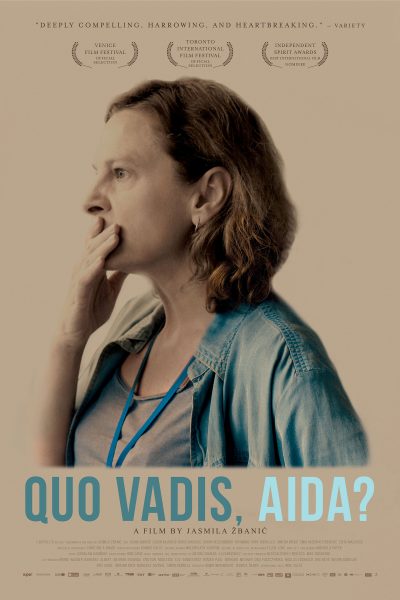
Some life experiences can involve truly hard pills to swallow. In fact, they can be so arduous to undergo that we may wonder why we’re having to endure such ordeals, especially when they involve elements we find unthinkable. Getting through that kind of torment might seem unbearable, and discovering the “reason” for it could be unfathomable. Under such circumstances, we can only hope that some aspect of clarity reveals itself, as is apparent in the chilling new historical drama, “Quo Vadis, Aida?”
Aida Selmanagić (Jasna Djuričić) is experiencing an ordeal that no one should have to endure. The Yugoslavian civil conflicts have been raging for several years, spilling from one constituent republic to another as the now-fragile union implodes and dissolves. By 1995, as this story begins, strife has made its way to the State of Bosnia and Herzegovina, where Aida lives with her husband, Nihad (Izudin Bajrovic), and her two adult sons, Hamdija (Boris Ler) and Sejo (Dino Bajrovic). She works as a translator for the United Nations peacekeeping force assigned to help protect the region’s citizens from aggressive incursions by invading forces from the neighboring State of Serbia. It’s a stressful job in many regards, but it’s about to get worse – much worse.
Aida and her family reside in the largely Muslim community of Srebenica in eastern Bosnia, not far from the border of Serbia, whose population consists of mostly Orthodox Christians. Srebenica is an area that the UN has declared a safe haven, one that its forces have vowed to protect, a promise that the local mayor (Ermin Bravo) has extreme reservations about. After a number of incidents, community officials have become skeptical about the “assurances” offered by Col. Karremans (Johan Heldenbergh), commander of the predominantly Dutch troops assigned by the UN to handle this task. And, unfortunately, that skepticism soon proves correct when Serb forces under Gen. Ratho Mladić (Boris Isakovic) invade Srebenica, savagely plundering the community and killing residents (especially men) at will.
As Serb forces brazenly stake their claim to their newly conquered territory, troops and local residents flee to the UN military compound outside of town to seek safety. However, there are far more refugees than the compound can handle. Aida, as a UN official, is protected and allowed to remain with the troops and the refugees who successfully managed to arrive before the compound’s gates were closed. However, with the compound’s capacity reached, her family and many of her friends are left to wait outside, their future uncertain. Aida makes a plea with Col. Karremans to allow her husband and sons to enter, but he explains that, unlike her, they are not official UN representatives and cannot be given preferential treatment. And, with Gen. Mladić’s troops now advancing on the compound, the uncertainty of that future grows ever more precarious.
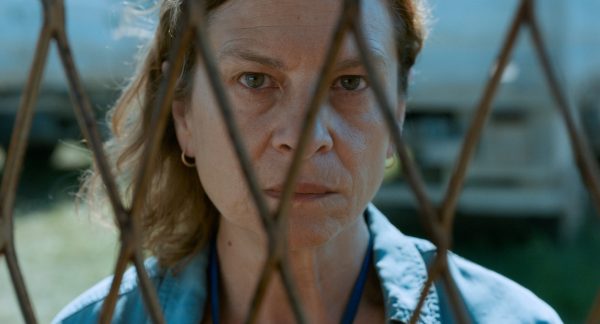
With circumstances threatening to spiral out of control, Col. Karremans and his aide, Maj. Franken (Raymond Thiry), desperately contact UN officials for instructions, requests that go unanswered. Given the size of the crowd inside the encampment (with not nearly enough facilities and provisions to address the need), as well as the growing masses assembling outside the compound and the encroaching Serbian troops, the situation is a disaster waiting to happen. With no help forthcoming from above, the UN delegation is forced into negotiating an agreement with Mladić, who has a notorious reputation for not keeping his word.
Mladić promises to provide safe passage for all of the refugees, those both inside and outside the compound. Fleets of buses and trucks soon begin arriving to transport the weary exiles out of the region. However, given Mladić’s track record, there’s ample doubt that he’ll abide by his assurances, especially when he and his brutal enforcer, Joka (Emir Hadzihafizbegovic), begin separating the men from the women and children. And perhaps no one has greater concern about this than Aida, given that her men are in the midst of that human culling.
As the situation grows ever more tense and UN forces are increasingly concerned about their own ability to safely escape, Aida scrambles to find a way to have her family included in the official delegation. She experiences a series of letdowns as each attempt at securing their welfare falls through. One can feel the fear pervading her being as she desperately seeks to protect Nihad, Hamdija and Sejo. But, with time running out, can she do this before it’s too late?
The siege of Srebenica was one of the most devastating incidents of the Yugoslavian civil conflicts, if not the 1990s overall. With the end of the Cold War, the abolition of South African apartheid and any number of other groundbreaking world events, it seemed at the time that the planet was becoming a more peaceful and civilized place. And then this happened – an outpouring of madness at a time when all indications were pointing to humanity heading in a different – and far preferable – direction.
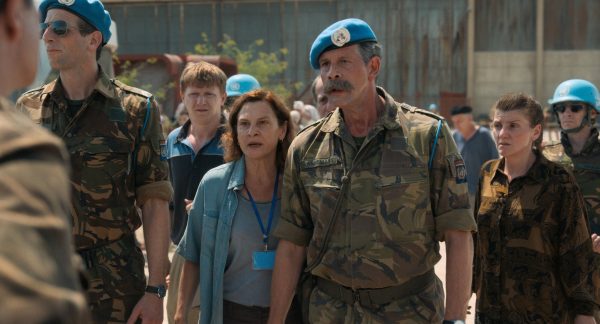
So why did this occur? That’s difficult to ascertain, yet one thing is for sure – it was an event through which both personal and collective dramas played out, much like what happened during other significant group conflicts, such as the world wars, the civil rights movement and a variety of other mass events. This film aptly illustrates how this unfolded in Bosnia, on both levels, with results that impacted individuals directly and group affiliations collectively.
As horrific as these incidents were, it’s nevertheless vital that we recognize how they were brought into being – through the conscious creation process, the philosophy that maintains we draw upon the power of our thoughts, beliefs and intents in manifesting the reality we experience. To be sure, one might legitimately wonder why anyone in his or her right mind would employ this philosophy in such a way, but, as its practitioners understand, it’s a doctrine that works no matter how we apply it, for better or worse. And, as this incident illustrates, the process can yield devastating consequences when implemented recklessly. In fact, what happened here could very well have resulted from a fundamental lack of awareness of that process; those who carried it out were focused solely on the outcome with no regard for how it came into being, particularly the mix of inciting beliefs responsible for its creation, a practice known as un-conscious creation or creation by default. That’s no excuse for what occurred, but it does help to explain why it may have happened.
Becoming conscious of this philosophy may have been one of the principal aims involved in this incident, one of many life lessons to be learned both personally and collectively as a result of this experience. Admittedly, this was an abhorrent and painful way for those lessons to be learned, regardless of the scale and intent through which these events occurred. However, for what it’s worth, and as difficult as this may be to accept, sometimes it takes events of great magnitude for messages like this to sink in. It’s a way of shocking and scaring ourselves so thoroughly that it slays the temptation to want to repeat such practices – or so it’s hoped. Based on how matters have unfolded in our world since 1995, however, it would appear we still have our work cut out for us on this front.
The Srebenica incident also provided an opportunity for a lesson in integrity, both for the UN forces and the Serbian troops, particularly when it comes to matters of keeping one’s word. As events unfold in the film, it’s apparent that both sides need schooling on this subject. The UN delegation, for example, learned a hard lesson about making promises that can’t be fulfilled, an experience essential for future undertakings of this nature. And the invading forces came face to face with what stems from outright lying, as evidenced by the fallout that came in the world’s reaction to the incident. Through conscious creation, we can get our lessons in either the hard way or one that goes easier on us. Based on what transpired here, it’s obvious to see which choices the principal players in this scenario made.
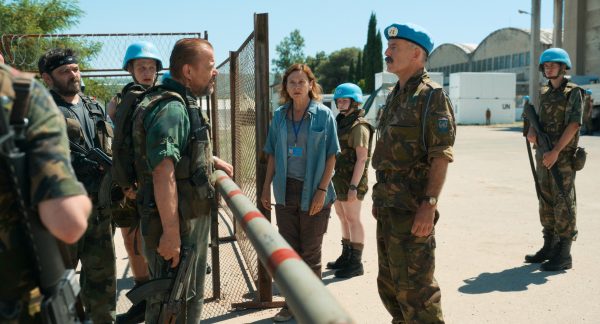
The life lessons explored here, though, have to do with more than just the foregoing issues. The mass event described above deals largely with lessons for the collective consciousness, as well as an attempt at the education of the uninformed. However, it also provides an opportunity for significant individual lessons. In Aida’s case, for example, this experience offered her a chance to face fears – big ones – to see if she could overcome them. It also allowed her to test her abilities to push limits, to seek the means to help herself and family out of a desperate situation, one where life and death are clearly on the line. These may not have been the best circumstances to explore these capabilities, but, if they offer the opportunity to push our boundaries, we may eventually look upon them differently as we make our way through the experience.
Some of you reading this may think that this is all hogwash, and good arguments could probably be made for that viewpoint. However, if nothing else, this event nevertheless unfolded for a reason, and I suspect it was to make a statement – that such atrocities are patently unacceptable, no matter what justification might be offered up for them. In the wake of the Holocaust, a clarion call went out proclaiming “Never again.” And, while Srebenica was certainly not on the same scale, the driving forces behind this incident were eerily similar to those that sparked its predecessor. Obviously, we as a species didn’t learn our lesson the first time through, so it took another such incident to draw attention to the inhumanity of these beliefs and actions. Given what’s happened in the time since 1995, it’s apparent that we still don’t get it, either. Until we do, there’s a good chance that these brutalities will continue to occur. How many will it take before the message sinks in? How many times must we manifest events that make statements like this until we at last see that they’re not serving us and that our energies are better put to other uses? From that standpoint, we can only hope that the victims of Srebenica will not have sacrificed themselves in vain.
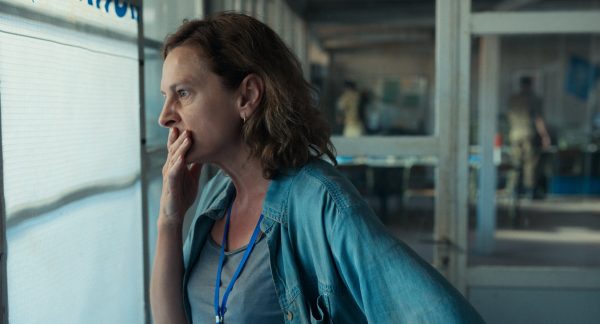
The Srebenica Massacre was one of the most horrific incidents of the Bosnian War, and the chilling events that led up to it are presented in unsettling detail in this superb, if troubling, historical account. Told largely from one individual’s perspective, the film follows her ordeal with palpable anguish and a desperate desire to find a way out of harrowing circumstances. Director Jasmila Žbanić’s latest puts viewers in the middle of the unfolding genocide, re-creating the horror and agony experienced by those caught up in it, but it does so without ever becoming graphic or gratuitous, unnerving though much of the narrative may be. The excellent ensemble cast, led by the award-worthy performance of Jasna Djuričić, sells this story so effectively that one can’t help but feel what the victims are going through on a gut level. “Quo Vadis, Aida?” will undoubtedly leave audiences uncomfortable and heartbroken, but it brings to light the unspeakable atrocities that occurred during this conflict in hopes that we never experience them again.
While this offering may not have been released with much fanfare, it has been deservedly lauded by critics. It has also been building an impressive list of accolades, including BAFTA Award nominations for best foreign language film and best director, an Independent Spirit Award nod for best international film, and, most importantly, an Oscar nomination for best international feature, an honor it truly deserves to win. It’s indeed heartening to see a film receive the praise it so richly deserves.
Remembering the past can be a painful experience. Yet the memory of such events generally lingers to remind us of what we went through in the hope that we never have to experience them again. The indelible mark left by such incidents is designed to send us in new directions, a future full of hope, enlightenment and compassion for ourselves and mankind. Let us hope we learn from those experiences and indeed follow those new paths.
Copyright © 2021, by Brent Marchant. All rights reserved.

No comments:
Post a Comment